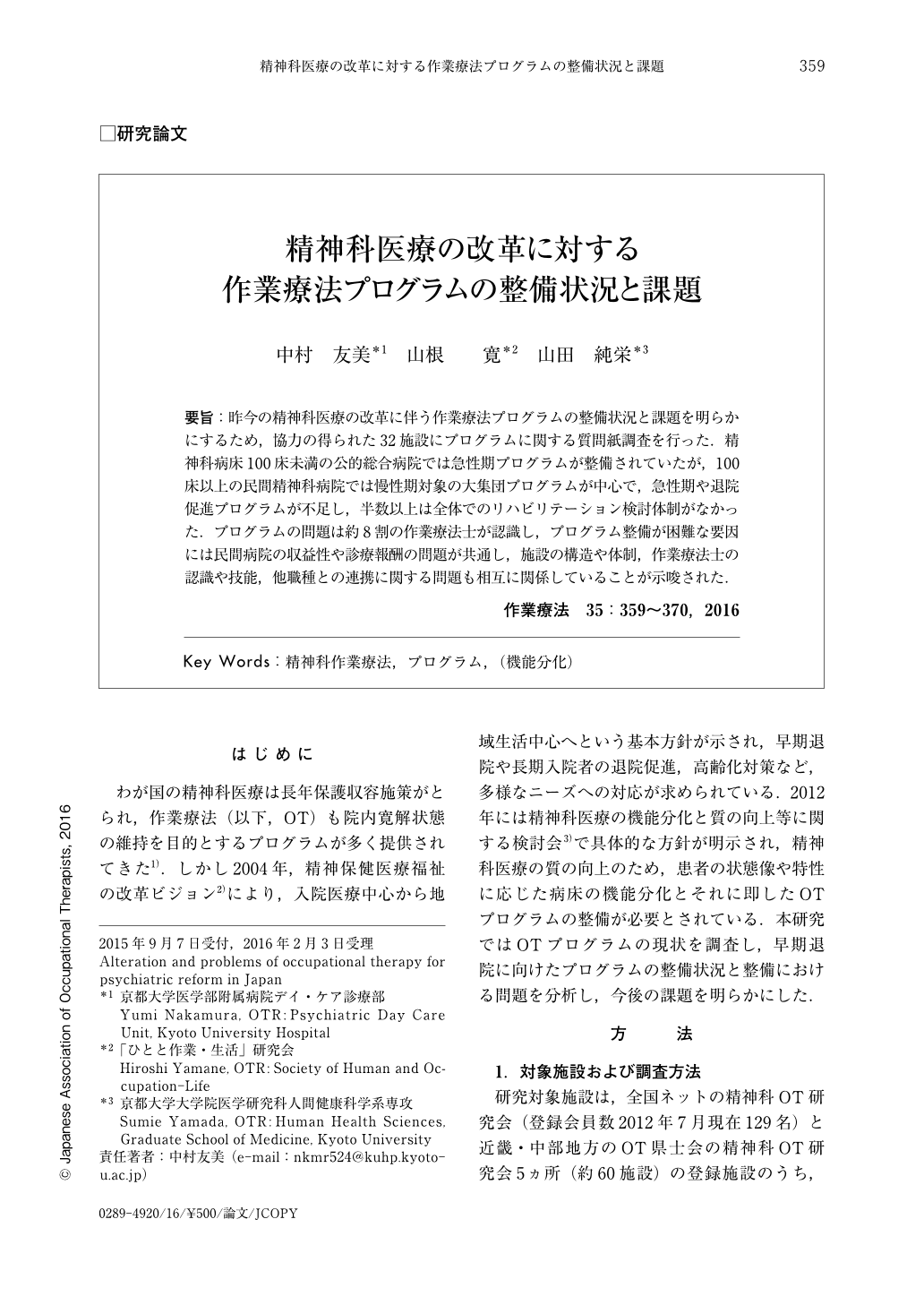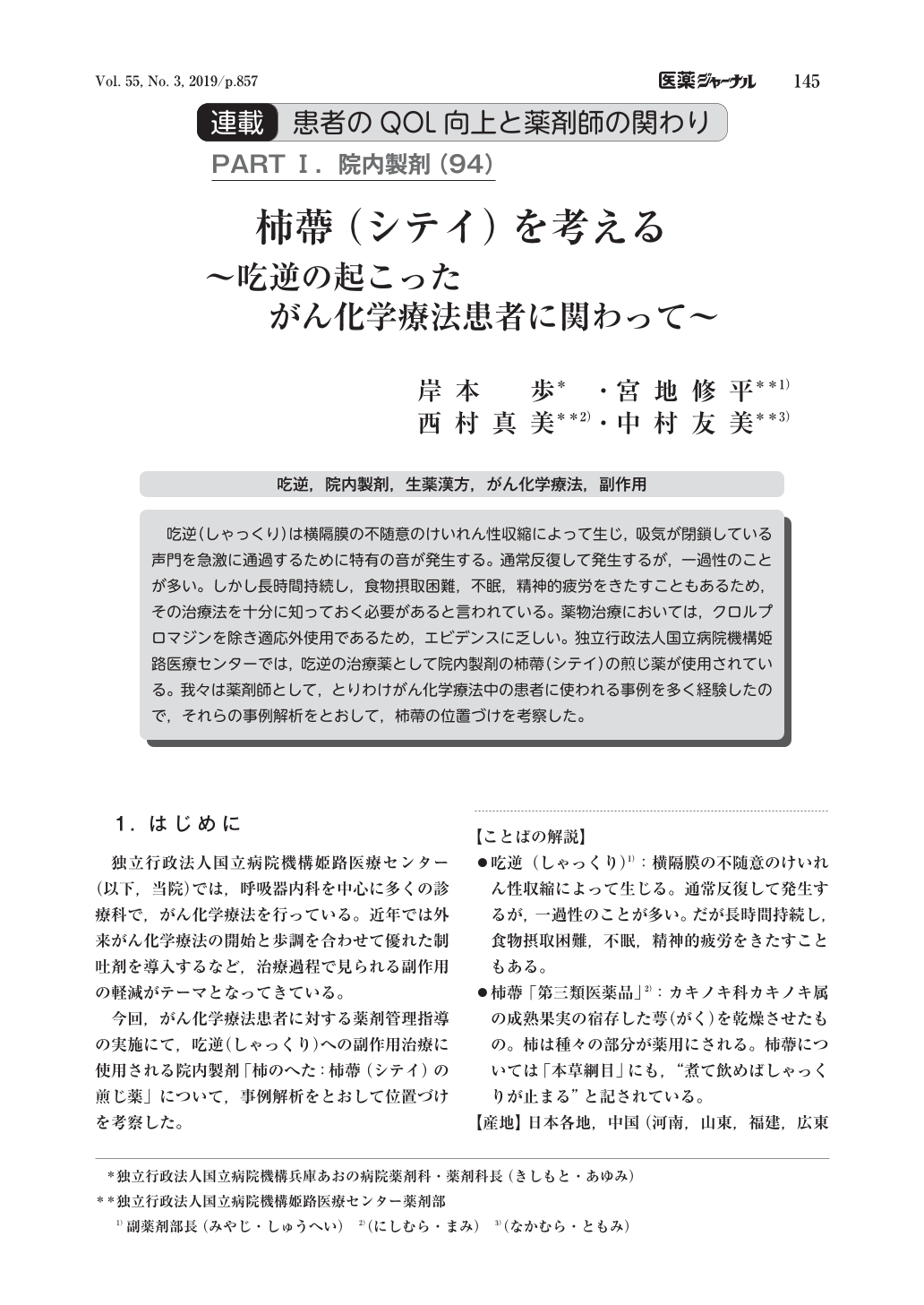1 0 0 0 OA 近代初期イングランド復讐劇による民衆心性の近代化への影響
本研究課題は、近代初期イングランド復讐劇による民衆心性への影響を明らかにすることを目指すものである。成果としては以下2点がある。1.数多く制作されジャンルを形成した復讐劇作品群が共有していた常套的様式の表象としての作用とは、ルネサンス的という文化的ムーブメントに位置付けて検証すると、個人主義的な自己のアイデアを表現するものと考えられる。復讐劇は、個人の概念を人々に明示する点で、近代的概念の媒体といえる。2.イングランド社会に見られた、演劇以外の他の芸術や娯楽、媒体における表象と復讐劇の関連性を見出し、それらの表象が、特に美学的・倫理的側面で、人々の近代的心性の形成に影響力を持ったと結論づけた。
1 0 0 0 精神科医療の改革に対する作業療法プログラムの整備状況と課題
要旨:昨今の精神科医療の改革に伴う作業療法プログラムの整備状況と課題を明らかにするため,協力の得られた32施設にプログラムに関する質問紙調査を行った.精神科病床100床未満の公的総合病院では急性期プログラムが整備されていたが,100床以上の民間精神科病院では慢性期対象の大集団プログラムが中心で,急性期や退院促進プログラムが不足し,半数以上は全体でのリハビリテーション検討体制がなかった.プログラムの問題は約8割の作業療法士が認識し,プログラム整備が困難な要因には民間病院の収益性や診療報酬の問題が共通し,施設の構造や体制,作業療法士の認識や技能,他職種との連携に関する問題も相互に関係していることが示唆された.
1 0 0 0 OA 知的障害者の親における身体活動・運動実施の阻害要因と促進要因
- 著者
- 荒井 弘和 中村 友浩
- 出版者
- 一般社団法人 日本体育・スポーツ・健康学会
- 雑誌
- 体育学研究 (ISSN:04846710)
- 巻号頁・発行日
- vol.54, no.1, pp.213-219, 2009-06-30 (Released:2009-11-05)
- 参考文献数
- 13
- 被引用文献数
- 3 3
The present study was aimed at exploring the barriers and facilitators of physical activity and exercise among the parents of children with intellectual disabilities. A qualitative study related to barriers and facilitators was conducted on 42 parents of children with intellectual disabilities through an open-ended questionnaire. Content analysis was performed by the KJ method (Kawakita, 1970), i.e., the barriers and facilitators of physical activity and exercise, by eight members. Consequently, 58 responses as barriers and 46 responses as facilitators were reported. Through the KJ method, nine items were categorized as barriers, and 10 as facilitators. In specific terms, the following items were categorized as barriers: “Too busy,” “Bad physical condition,” “To have to care for one's family,” “Not enough psychological status,” “Bad weather,” “Insufficient information,” “Not economically viable,” “Nowhere to exercise and conduct physical activity,” and “Nobody to do it with.” The following items were categorized as facilitators: “To have people to do it with,” “A good environment and weather,” “Time,” “To enhance one's athletic performance,” “To be fun,” “To have a goal,” “To feel good,” “Not to have care-giving obligations,” and “To have already paid for membership fees.” The results of our study show that the parents of children with intellectual disability should utilize their family members not as a barrier but as a facilitator. The results of this study are expected to be used as basic data to support parents' physical activity and exercise behavior.
吃逆(しゃっくり)は横隔膜の不随意のけいれん性収縮によって生じ,吸気が閉鎖している声門を急激に通過するために特有の音が発生する。通常反復して発生するが,一過性のことが多い。しかし長時間持続し,食物摂取困難,不眠,精神的疲労をきたすこともあるため,その治療法を十分に知っておく必要があると言われている。薬物治療においては,クロルプロマジンを除き適応外使用であるため,エビデンスに乏しい。独立行政法人国立病院機構姫路医療センターでは,吃逆の治療薬として院内製剤の柿蔕(シテイ)の煎じ薬が使用されている。我々は薬剤師として,とりわけがん化学療法中の患者に使われる事例を多く経験したので,それらの事例解析をとおして,柿蔕の位置づけを考察した。
1 0 0 0 OA 大学初年次生の生活習慣と取得単位数の関係
- 著者
- 木内 敦詞 中村 友浩 荒井 弘和 浦井 良太郎 橋本 公雄
- 出版者
- 公益社団法人 全国大学体育連合
- 雑誌
- 大学体育学 7.1 (ISSN:13491296)
- 巻号頁・発行日
- pp.69-76, 2010-03-15 (Released:2018-01-09)
生活習慣と学力が関連することはこれまで経験的に述べられてきた.しかしながら,それを十分に裏づける学術的データはわが国においてほとんど提出されていない.本研究は,大学初年次生の生活習慣と修学状況(取得単位数)との関係を明らかにすることを目的とした.近畿圏にある工科系大学男子1068名が本研究に参加した.彼らの初年次前期取得単位数は以下のとおりであった;25単位以上(52%,N=554:A群),20-24単位(30%,N=317:B群),15-19単位(12%,N=131:C群),15単位未満(6%,N=66:D群)。前期授業終了時における健康度・生活習慣診断検査(DIHAL.2,徳永2003)から,以下のことが明らかとなった.すなわち,「食事」「休養」尺度および「生活習慣の合計」において,D<C<B<A群の順位傾向とともに,D群に対するA群の有意な高値(P<.01)が示された.特に,「食事の規則性」「睡眠の規則性」スコアにおいては,明確なD<C<B<A群の順位性とともに,食事や睡眠を軸とした"規則的な生活リズム"の重要性が示された.これらの結果は,大学入学直後から教育の枠組みの中で,健康的なライフスタイル構築のための健康教育を実施することの必要性を支持している.
- 著者
- 中村 友美
- 出版者
- 日本アーカイブズ学会
- 雑誌
- アーカイブズ学研究 = Journal of the Japan Society for Archival Science (ISSN:1349578X)
- 巻号頁・発行日
- no.34, pp.70-73, 2021-06
1 0 0 0 IR 障害支援フィールドにおけるCOVID-19をめぐる現状と課題
- 著者
- 中村 友香 藤澤 憲 中西 裕子 西林 佳人 守谷 安津蓉 小河 理恵子 髙橋 真一郎 亀井 有美 高橋 眞琴 Yuka NAKAMURA Ken FUJISAWA Yuko NAKANISHI Yoshito NISHIBAYASHI Atsuyo MORIYA Rieko OGAWA Shinichiro TAKAHASHI Yumi KAMEI Makoto TAKAHASHI
- 出版者
- 鳴門教育大学地域連携センター
- 雑誌
- 鳴門教育大学学校教育研究紀要 = Bulletin of Center for Collaboration in Community Naruto University of Education (ISSN:18806864)
- 巻号頁・発行日
- no.35, pp.29-38, 2021-02
新型コロナウイルス感染症(以下,COVID-19)の対応に際して,緊急事態宣言発出後,筆者らが関与する教育関係,福祉関係,医療関係の最前線での実践現場においては,これまでの実践内容にない対応を求められた。本論文では,筆者らが関与している教育関係,福祉関係,医療関係の最前線での実践現場についての現状と課題を把握していくことを目的とした。現状として,実践現場での感染症予防対策以外にも教材作成や労務上の対応が求められており,課題として,児童・生徒,利用者の心のケアや実践者自身のバーンアウトへの対応必要性も示唆された。
- 著者
- 中村 友洋 林田 哲哉 船津 良平 添野 拓司 山下 誉行 柳 忠明 吉田 哲男
- 出版者
- 一般社団法人 映像情報メディア学会
- 雑誌
- 映像情報メディア学会冬季大会講演予稿集 (ISSN:13434357)
- 巻号頁・発行日
- vol.2013, pp.11-12-1-_11-12-2_, 2013
We developed a new Super Hi-Vision (SHV) camera toward shooting theater contents. We designed signal processing for achieving higher sensitivity than the conventional SHV cameras and housing to reduce acoustic noises. We measured sensitivity and noises, and then confirmed this camera specification was satisfactory for shooting heater contents.
- 著者
- 中村 友代
- 出版者
- 日本西洋古典学会
- 雑誌
- 西洋古典学研究 (ISSN:04479114)
- 巻号頁・発行日
- vol.61, pp.60-72, 2013
The "Alexander Sarcophagus" is one of the most celebrated works in the Hellenistic period. One of the six reliefs that decorated the sarcophagus shows a battle scene with Alexander the Great even though most scholars believe that the sarcophagus was not made for him but for Abdalonymos, the last king of Sidon in the 4^<th> century BCE. This paper aims at an iconographic interpretation of the battle scene featuring Alexander the Great through comparison with battle scenes made in the same period. What was the most important agenda for Abdalonymos, and what message did he intend to convey with the battle scene? Hence I would like to suggest a different point of views from previous studies. Most scholars identify the figure on the far left as Alexander wearing a lion-skin headgear. Based on his depiction, many scholars suggested that the relief shows a historical battle scene and tried to establish a connection between the relief and literature sources. Nowadays, the scene is often identified as the battle of Issus(333 BCE). There are, however, scholars who suggest a different interpretation, namely that the relief shows a symbolic or unidentifiable generic battle scene. It should be worthwhile to compare this battle scene with other contemporary battle scenes - for example, on the "Amazon Sarcophagus" in Vienna - in order to throw some light on the theme. As far as we know, similar works represented generic figures with idealized features. There are many similar motifs between these works and the Alexander sarcophagus that could be categorized as conventional topoi. A noteworthy difference between the battle scene on the Alexander sarcophagus and comparable reliefs' lies in the rendering of Alexander. Comparing the sarcophagus with the "Alexander Mosaic", which also depicted battle scene with Alexander, we find many similar motifs. Both works are considered to be influenced by the same original, a painting made in the 4^<th> century BCE. But it should be noted that there are distinguished differences between both works. Firstly, the expression on the sarcophagus is far less triumphant than on the mosaic. Secondly, Alexander is portrayed on the sarcophagus wearing lion-skin headgear, it's clearly an expression of his divinity. We know that Alexander wore lion-skin headgear which is an attribute of Hercules' because he saw himself as a descendant and rival of Hercules. Besides, there is no reference proving that Alexander fought with the lion-skin headgear on battlefields. According to ancient literature sources, Abdalonymos was appointed king of Sidon by Alexander. For Abdalonymos, it was most important to commemorate both the authority and the divinity of Alexander, the origin of his own royal authority. Very probably, the rendering of the victory over Persia was to him a matter of secondary concern.
1 0 0 0 OA 外側手綱核をターゲットとした新規幼少期ストレスモデル:経験が惹起する精神疾患機序
過度の幼少期ストレスが成長後の不安やうつを惹起するメカニズムを明らかにするため、生後10-20日のマウスの仔を母親から毎日3時間分離し,成長後の個体の行動とストレス関連部位の外側手綱核、海馬、扁桃体の神経回路変化を調査した。幼少期ストレスを与えた群では、コントロールと比較して外側手綱核特異的に抑制性のParvalbumin陽性細胞数が減少し、ストレス下の興奮性神経細胞の活動性が上昇し、不安様行動とうつ様行動がみられた。本研究では不安やうつを引き起こす幼少期ストレスが外側手綱核特異的に抑制性回路を改変して高次機能に影響を及ぼすことを明らかにした。
1 0 0 0 OA 身体をつなぐ会話 現代ネパールの糖尿病クリニックを事例に
- 著者
- 中村 友香
- 出版者
- 日本文化人類学会
- 雑誌
- 文化人類学 (ISSN:13490648)
- 巻号頁・発行日
- vol.83, no.4, pp.515-535, 2019 (Released:2019-05-12)
- 参考文献数
- 36
近代医療は地理や経済、政治や文化など様々な地域的状況に結び付いて展開する。ネパールにおける近代医療は、1990年代後半以降、短期間に急速に展開してきた。近代医療は当該地域で暮らす人々にとって欠かせないものになりつつあるが、具体的にどのような地域的特徴を持ちながら展開しているのかについてはこれまでほとんど論じられていない。本稿では、ネパールの近代医療の臨床の場の状況を、病いの語りと南アジアのパーソンをめぐる議論を鍵に明らかにしようと試みる。 これまでの病いの語り研究は、社会装置・権力装置としての近代医療を反省する形で発展してきた。ここでは、個別具体的経験をめぐる個人の語りが重視された。南アジアのパーソンをめぐる議論は、様々な宗教実践や社会実践の事例を通じて、切り離しが困難なつながり合ったパーソンという特徴を示してきた。 本稿はこうした二つの議論を基に、内分泌科クリニックの待合室と診察室におけるやりとりを分析する。それにより、ここでは(1)病いの語りは間身体的関係を持つ家族らにも共有されており、(2)繰り返される語りを通じて、医師をもその関係に取り込もうとしていることを明らかにしていく。
1 0 0 0 昭和期の岡山茶道関連記録 幽清会川浪家資料について
- 著者
- 中村 友美
- 出版者
- 岡山県立記録資料館
- 雑誌
- 岡山県立記録資料館紀要 (ISSN:18808506)
- 巻号頁・発行日
- no.16, pp.51-60, 2021-03
1 0 0 0 OA 担子菌きのこ培養菌糸体の機能性における研究体系 : 薬用きのこ:メシマコブに注目して
- 著者
- 中村 友幸
- 出版者
- 日本きのこ学会
- 雑誌
- 日本きのこ学会誌 (ISSN:13487388)
- 巻号頁・発行日
- vol.17, no.4, pp.137-144, 2009-12-31 (Released:2018-03-15)
- 参考文献数
- 41
メシマコブは古くから漢方に供せられてきたきのこであり,高い生物活性を有するきのことして注目されている.近年,メシマコブ菌糸体は機能強化食品として幅広く用いられてきている.本報告では,メシマコブを用いた遺伝解析,培養条件の検索,および各種機能性の調査に関する最近の研究成果を報告する.特に,抗酸化作用,抗腫瘍作用,抗アレルギー作用,さらに新規の興味深い機能性研究に関しても紹介する.将来の研究でメシマコブの培養菌糸体とその有効成分が各種疾病に利用されることを期待している.
1 0 0 0 OA 地震動特性に基づく応答変位の時刻歴期待値の評価法
- 著者
- 中村 友紀子 壁谷澤 寿海
- 出版者
- 日本建築学会
- 雑誌
- 日本建築学会構造系論文集 (ISSN:13404202)
- 巻号頁・発行日
- vol.65, no.532, pp.51-56, 2000-06-30 (Released:2017-02-03)
- 参考文献数
- 13
- 被引用文献数
- 3 3
Expected value of time-history response can be formulated by assuming the phase differences spectrum in Fourier transform of earthquake waves as a normal probability curve. The effect of damping on the response spectrum can be obtained based on the formula. The ratio of maximum displacement to previous peak displacement during nonlinear response can also be calculated theoretically, which may be used for estimation. Both theoretical values were compared with those calculated from the responses to earthquake motions, from which a fair correlation was observed, especially in relation to the duration of earthquake motions.
1 0 0 0 IR 危機は希望への門戸
- 著者
- 中村 友太郎
- 出版者
- 上智大学
- 雑誌
- 人間学紀要 (ISSN:02876892)
- 巻号頁・発行日
- vol.37, pp.3-4, 2007
- 著者
- 嘉藤 佑亮 中村 友昭 長井 隆行 山野辺 夏樹 永田 和之 小澤 順
- 出版者
- 一般社団法人 人工知能学会
- 雑誌
- 人工知能学会全国大会論文集 第34回全国大会(2020)
- 巻号頁・発行日
- pp.1Q4GS1101, 2020 (Released:2020-06-19)
本研究では人が行う巧みな動作をロボットに学習させ,小売店舗における商品整列動作を行う.人は初期環境が異なれば同じタスクであっても異なる戦略を使うことでより最適な動作を行うことができる.そこで我々はロボットが初期状態に応じた戦略を自律的に選択できるシステムを提案し,シミュレーション上の強化学習によって獲得した複数の整列動作モデルとそれらを使い分けるための判別器を作成した.このシステムを使用して整列タスクを実施した結果,1つの動作モデルのみを使用した場合よりも精度の高い整列を実現した.また,シミュレーション上で学習した動作モデルを使用し,実環境においても整列動作が可能であることを確認した.
1 0 0 0 OA 身体活動ピラミッドの概念と行動変容技法による大学生の身体活動増強
- 著者
- 木内 敦詞 荒井 弘和 浦井 良太郎 中村 友浩
- 出版者
- 社団法人全国大学体育連合
- 雑誌
- 大学体育学 (ISSN:13491296)
- 巻号頁・発行日
- vol.3, no.1, pp.3-14, 2006-03-15
本研究の目的は、身体活動ピラミッド(Corbin & Lindsey, 1997)の概念と行動変容技法を取り入れた半期の体育授業が、日本の大学の初年次男子学生(N=322)の身体活動量に及ぼす影響を検討することであった。非介入群(N=156)は「健康関連体力テスト2回」「講義1回」「スポーツ活動9回」を含む授業を受講し、介入群(N=166)はそれに加えて身体活動増強のためのプログラム「身体活動ピラミッドの概念学習」「行動変容ワークシートの実践」「日常における身体活動状況のモニタリング」を含む授業を受講した。受講の前後で日歩数は変化した(非介入群7841±2965歩-7693±2781歩[-1.9%]、介入群7890±2821歩-8546±2861歩[+8.3%])。分散分析の結果、非介入群に対する介入群の日歩数増加が示された。この介入群における日歩数の増加は、平日よりも休日の歩数増加に起因していた。身体活動評価表(涌井・鈴木,1997)を用いて受講前・受講後・追跡期における身体活動パターンを検討した結果、低い強度の身体活動量「日常活動性」ではいずれの測定時期においても両群に有意な差異は認められなかった。一方、中等度以上の強度の身体活動量「運動・スポーツ」では、受講後において非介入群に対する介入群の有意な高値が示されたが、受講終了3カ月後の追跡期では、「運動・スポーツ」における両群間の有意な差異は示されなかった。結論として、身体活動ピラミッドの概念学習と行動変容技法を取り入れた体育授業は、受講期間中、日本の大学の初年次男子学生の身体活動を増強することが明らかとなった。
- 著者
- 木内 敦詞 荒井 弘和 浦井 良太郎 中村 友浩
- 出版者
- 一般社団法人日本体育学会
- 雑誌
- 体育学研究 (ISSN:04846710)
- 巻号頁・発行日
- vol.53, no.2, pp.329-341, 2008
- 被引用文献数
- 2
The purpose of this study was to investigate the effects of a physical education program based on behavioral science, which includes homework (project First-Year Physical Education: FYPE) on the health level and lifestyle of first-year college students. The study participants comprised 1,090 male college freshmen from an institute of technology in the Kinki area of Japan (intervention group, N=515; non-intervention group, N=575). The programs that were common to all the classes were as follows (the numbers correspond to the sequence of activities of the program). 1: guidance, 2–4: sports activity, 5: lecture (health science), 6–8: sports activity, 9: lecture (health science), 10–12: sports activity, and 13: summary of the class. Health behavior promotion programs were intended only for the intervention group. The programs comprised (1) education on behavioral change skills (self-monitoring, goal setting, self-reinforcement, and so on), and (2) out-of-class practical assignments such as physical education homework. We evaluated the health level and life habits of the students by using the Diagnostic Inventory of Health and Life Habit (DIHAL; Tokunaga, 2003) and evaluated their physical activity level using the Physical Activity Assessment Scale (PAAS; Wakui & Suzuki, 1997). As a result, significant intervention effects were observed with regard to the DIHAL scales for "Eating," "Resting," and the "Sum of lifestyle," and with regard to the subscales of "Level of physical health," "Eating regularly," "Relaxing," "Sleeping regularly," and the "Fulfillment level of sleep." The PAAS revealed a significant intervention effect with regard to "Daily activity," which indicates the relatively light physical activities in daily life; however, this was not observed with regard to the DIHAL scale of "Exercise." These results clearly indicate that physical education programs based on behavioral science and including homework can improve the overall lifestyle (namely, physical activity, eating, and resting) of first-year college students.
1 0 0 0 体育の宿題が大学生の日常身体活動量と健康関連体力に及ぼす効果
- 著者
- 木内 敦詞 荒井 弘和 中村 友浩 浦井 良太郎
- 出版者
- 日本スポーツ教育学会
- 雑誌
- スポーツ教育学研究 (ISSN:09118845)
- 巻号頁・発行日
- vol.25, no.1, pp.1-9, 2005
- 被引用文献数
- 3
The purpose of this study was to investigate the effects of physical education [PE] homework on the amount of daily physical activity and the health-related fitness of university freshmen. Two hundred and eighty four Japanese university freshmen were allocated to either homework group (<i>N</i>=133) or control group (<i>N</i>=151). The tasks for homework group were daily life (out of class) self-monitoring of physical activity to promote daily physical activity, as well as fitness tests and sports activity during the class. The tasks for control group were health-related fitness tests and sports activity during the class. The Physical Activity Assessment Scale (PAAS; Wakui & Suzuki, 1997), which consists of three subscales, was used to evaluate physical activity patterns of the participants. The three subscales were 1) Exercise/Sports: measures exercise/sports-related physical activities with more than moderate intensity, 2) Time Management: measures the ability of time management in being occupied and having little time for exercise/sports participation, and 3) Daily Activity: measures relatively light physical activities in daily life. Health-related fitness (cardiovascular endurance, muscle strength/endurance, flexibility, and body fat) was also measured. As the result of ANOVA, PE homework in daily life was found to increase; 1) the amount of physical activity widely with light to moderate intensity, 2) some healthrelated fitness related to practical homework. These results suggest that PE homework can contribute to promoting daily physical activity required for fitness program emphasized today.


